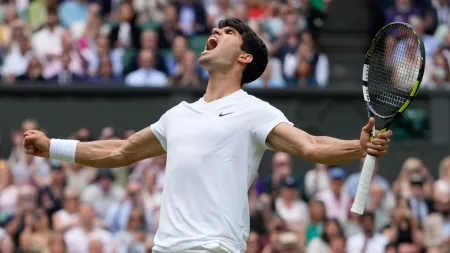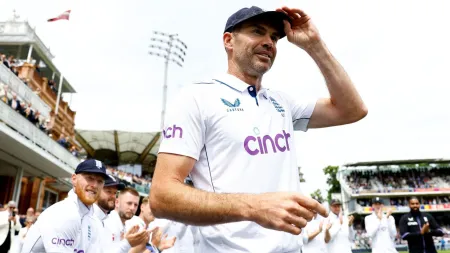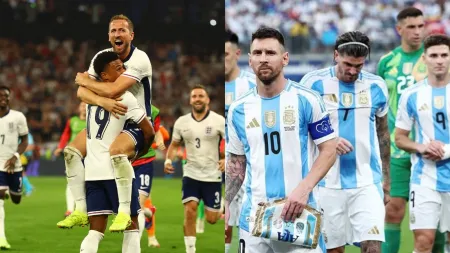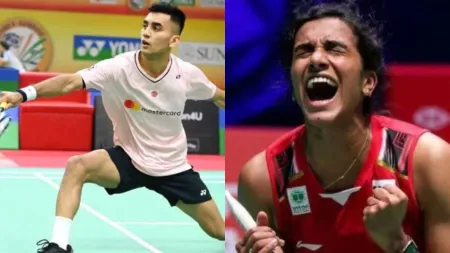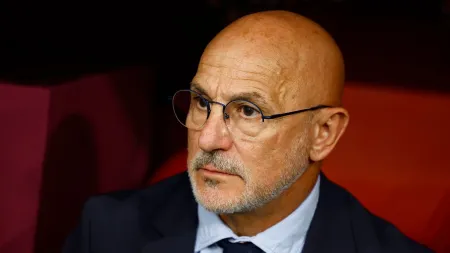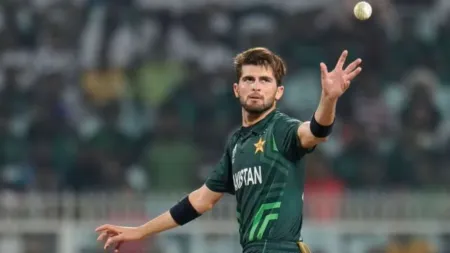Wimbledon have a heart, love Novak Djokovic and cheer Carlos Alcaraz too
It’s Carlos Alcaraz vs Novak Djokovic on the final Sunday of the Wimbledon once again. Last time Djokovic tried but failed to win the title or the hearts of the fans. He gave his best, played his part in making it an epic, said the right things after the loss and even shed tears. Still it wasn’t enough to win over the strawberry-cream consuming regulars.
There was one touching moment from that match. It was when Djokovic got the microphone in hand. “I have to move on and be stronger hopefully,” he said just before his eyes fell on his eight-year-old son Stefan in the box. “My son, he is still smiling.” he said and he broke down. “I love you … thank you for supporting me .. I will give you a big hug.” It was actually the father who needed the hug. Djokovic couldn’t have said the same to the majority in the stands. Stefan, his mother and sister, and the few others around him were maybe the only ones who wanted Djokovic to beat the 20-year-old Spaniard.

This Sunday, on the same stage, the very same cast will again converge. For the sequel, there is a slight change in the look of the lead character. Djokovic wears a knee cap, a prominent reminder of the knee surgery he had 25 days back. On sporting fields such storylines draw sympathy. But not if you are called Novak Djokovic. The script too is expected to be the same, though a new twist to the climax can’t be ruled out. Djokovic can be the winner but he surely wouldn’t be a popular one.
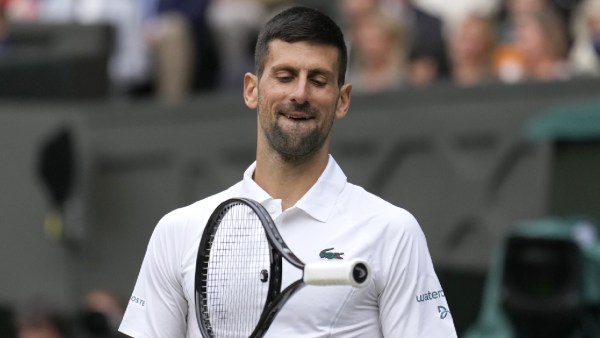 Novak Djokovic of Serbia reacts by throwing his racket in the air as he plays against Lorenzo Musetti of Italy during their semifinal match at the Wimbledon tennis championships in London. (AP)
Novak Djokovic of Serbia reacts by throwing his racket in the air as he plays against Lorenzo Musetti of Italy during their semifinal match at the Wimbledon tennis championships in London. (AP)
In his Round of 16 match, he felt he was booed. There are many who say he read the crowd wrong. In the semi-final win over Lorenzo Musetti, he had a wry smile on his face when someone in the crowd let out a shout to distract him during rallies and again when he was about to serve. “I hope Djokovic doesn’t take this personally,” said a scared commentator. Djokovic’s “Gooodnight” taunt after the “Boooos” has made the Wimbledon stake-holders nervous. The Gentlemen were called unfair, how could that be fair?
Djokovic didn’t wish them Gooodnight again but did use his racket and play the violin. The Serb has done it before, he said the play acting was for his daughter, who has found a liking for the instrument. Others say he was giving a sad background score for the gloom around the court, setting the mood for the ones not happy with him winning. Boos would be heard again. Djokovic, like the conductor, would coordinate the cat calls.
The English press say Djokovic has embraced the role of Wimbledon’s pantomime villain. It’s actually a headline in a leading national newspaper. He is being called over-sensitive, blamed for turning everything into a ‘Him vs The World’ tirade, seen as someone needy, trying too hard to get love and adoration.
He is even being compared to Elon Musk, the egoist tycoon who “craves recognition of his successes in the form of public adoration”. Brutal conclusions follow this bizarre comparison. The article ends with a profound line that goes thus – “You can’t buy love. You can’t bully your way to it either.” They say he hears voices. When they say Ruuuu, he hears Booo. Maybe, if one has walked in Djokovic’s shoes for the past 37 years, you do.
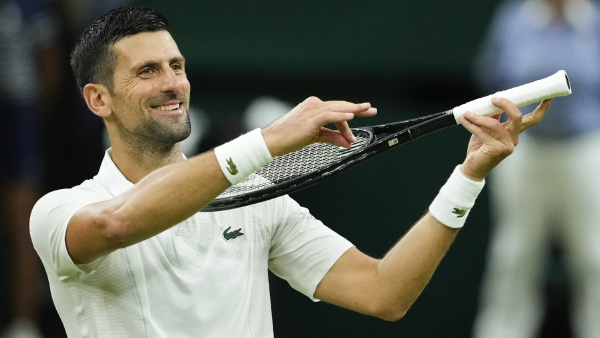 Novak Djokovic of Serbia celebrates after defeating Holger Rune of Denmark in their fourth round match at the Wimbledon tennis championships in London. (AP)
Novak Djokovic of Serbia celebrates after defeating Holger Rune of Denmark in their fourth round match at the Wimbledon tennis championships in London. (AP)
If he wins the final on Sunday, Djokovic will have 8 Wimbledon titles, same as Federer. But will that make him more popular than the Swiss? Never. It’s the same story at the French Open where Rafael Nadal will rule forever. What about the US Open? Here’s a short story that will help.
After losing to him in the 2008 US Open quarter-finals, Andy Roddick had pushed Djokovic against the changing room’s metal locker and threatened violence. The two had a running verbal battle throughout the tournament and now it had come to this.
Roddick was the one who started it. Before the match, at the press conference, the American had ridiculed the Serb’s frequent injuries. “It could be bird flu, anthrax … it could be anything,” he had said. The reporters had chuckled. Djokovic didn’t like it. At the post-match on-court interview he said, “it wasn’t nice to say that I was faking injury”.
Now, Roddick was peeved and he wanted to settle the matters like thugs do. It was the sudden appearance of the Serb’s intimidatingly burly fitness trainer that separated the two. He didn’t suffer physical harm but Djokovic was hurt. Did it heal with time? Not exactly. After many years, as recently as last year, when Djokovic won his record 24th Grand Slam title at the US Open, who did the organisers call to hand over the trophy? Andy Roddick. And then they say he was over-reacting.
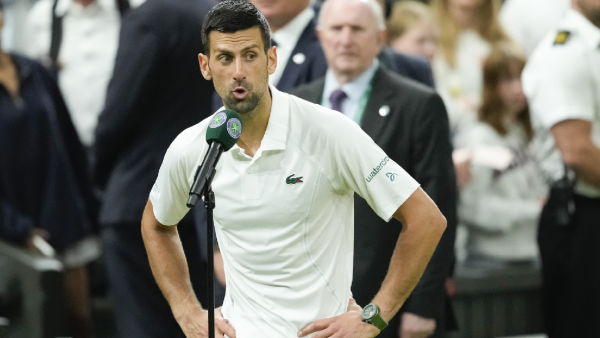 Novak Djokovic of Serbia reacts as he is interviewed after defeating Holger Rune of Denmark in their fourth round match at the Wimbledon tennis championships in London. (AP)
Novak Djokovic of Serbia reacts as he is interviewed after defeating Holger Rune of Denmark in their fourth round match at the Wimbledon tennis championships in London. (AP)
The mystery of why “they say Ruuuu and he hears Booo” starts from the days a young Djokovic’s ear drums had vibrated to the sound of screaming F-117s bombers in the late 90s. Even after he travelled the world and became a tennis pro the anger of those days stayed with him. He has said in interviews how he could never understand why NATO nations joined together to bomb the streets of his tiny nation. With time those wounds healed, he took a spiritual path, his faith taught him to forgive and forget. He understood that he would always be the third-wheel in the Nadal-Federer era but what has perplexed him was the indifference and hate that he evoked even after they left the scene.
He has tried to find peace but the quest is far from over. Mark Hodgkinson’s intriguing book Searching for Novak: The Man behind the enigma, mentions the tennis great’s close bond with the late basketball legend Kobe Bryant. He writes how the two shared experiences of handling ups and downs.
This week at Wimbledon the GOATs would have spoken a lot. And Kobe would have reminded Djokovic of one of his quotes he really liked. “Haters are a good problem to have. Nobody hates the good ones. They hate the great ones,” Kobe would often say. Wimbledon this Sunday needs to be kind to the champion player who has given the world endless entertainment. They can attempt to prove Kobe wrong. They can cheer for Alcaraz but also try loving the great Djokovic.
Send feedback to sandydwivedi@gmail.com
Disclaimer: The copyright of this article belongs to the original author. Reposting this article is solely for the purpose of information dissemination and does not constitute any investment advice. If there is any infringement, please contact us immediately. We will make corrections or deletions as necessary. Thank you.
